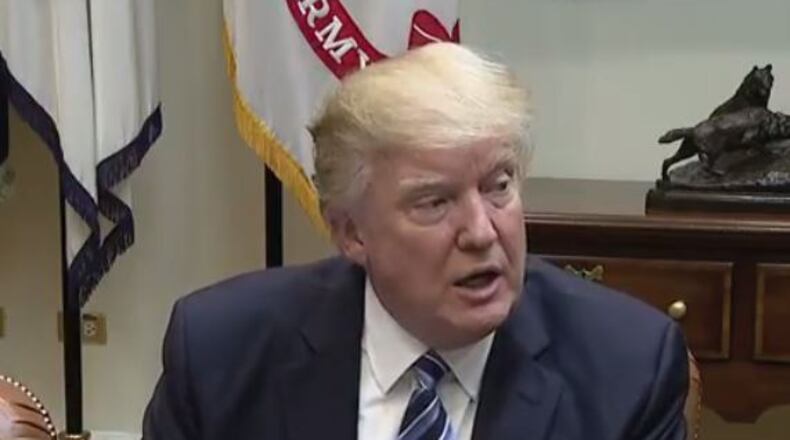In a closed door meeting with House Republicans at the U.S. Capitol, President Donald Trump on Tuesday urged GOP lawmakers to get on board with a Republican health care overhaul bill that he supports, arguing that if the plan goes down to defeat later this week, it could cost Republicans their majorities in both the House and Senate in the next election.
Here is what came out of that meeting:
1. Trump tries to make the final sale. There was laughter and applause inside as the President cajoled reluctant Republicans to get on board. "Look, the guy is very personable," said Rep. Markwayne Mullin (R-OK). "He speaks bluntly." At one point, Mr. Trump had the leader of the Freedom Caucus, Rep. Mark Meadows (R-NC) stand up for some good-natured ribbing. "I'm still a no," Meadows told reporters after the meeting, saying he was worried about policy matters. But Meadows noted the effectiveness of the Trump message. "You know, if this was a personality thing, we wouldn't be having these discussions," Meadows added. In other words - as multiple Republicans told reporters after the meeting - this President is very effective in lobbying lawmakers for their support.
2. Trump warns of GOP election losses if health care is defeated. In making his argument for Republicans to back the GOP health plan, the President warned Republican lawmakers that they would suffer at the ballot box in the 2018 mid-term elections. Rep. Walter Jones (R-NC) said the argument was basically, "politically, it's the right thing to do." Jones is still against the bill. "The American people are expecting us to do this," said Rep. Barry Loudermilk (R-GA), as he noted that this was something every Republican vowed to do in the 2016 campaign. "The political repercussions are we might lose the House and the Senate next year," said Rep. Chris Collins (R-NY) about not approving the health bill.
3. Trump arguments don't sway some Republicans. After the Trump visit, there were still some more conservative members of the House Freedom Caucus who weren't interested in buying the plan that the President was selling. "All I'm concerned about is doing what I told the voters in the Fourth District of Ohio what I was going to do," said Rep. Jim Jordan (R-OH), who won't budge on his opposition, as he wants a full repeal of the Obama health law, and nothing less. "The President did a great job with his presentation, but the legislation is still bad; it doesn't do what we told the voters we were going to do, and I'm still opposed to it," Jordan told reporters.
4. But other Republicans seemed to move to back the bill. While reporters crowded around GOP lawmakers like Jordan and Meadows - who are still opposed to the health care bill - there were others who seemed like they were coming around on the plan. Some of it was related to Trump the Cajoler, as he urged specific lawmakers in the GOP meeting to get on board. For others, it was the changes in the bill that have been made. "I'm encouraged by the process," said Rep. Mario Diaz-Balart (R-FL). "He did refer to quite a few of the changes," said Rep. Tom MacArthur (R-NJ), a more moderate Republican who has been on the fence in recent weeks. In the hallways, it seemed like the numbers were going in the right direction for Speaker Paul Ryan and the White House.
5. Republicans defend specific provision on Medicaid in New York. As the GOP unveiled changes to the health care bill on Monday night, one provision on a New York-specific issue quickly attracted the attention of reporters digging through the legislative text. It wasn't a plan that gives extra money to New York, but rather one that could make the state pay the full cost of Medicare coverage, and not county governments far from Manhattan. "That really brought the New Yorkers on board," said Rep. Chris Collins (R-NY), as he happily defended the addition. What the change would do is stop the state of New York from forcing a number of counties to chip in $2.3 billion in money to add to state Medicaid coverage for low-income residents, mainly in the New York City area. "In my county, that's 83 percent of our property tax levy," Collins told reporters.
House leaders are still planning a vote on the GOP health care bill on Thursday.
About the Author
The Latest
Featured



